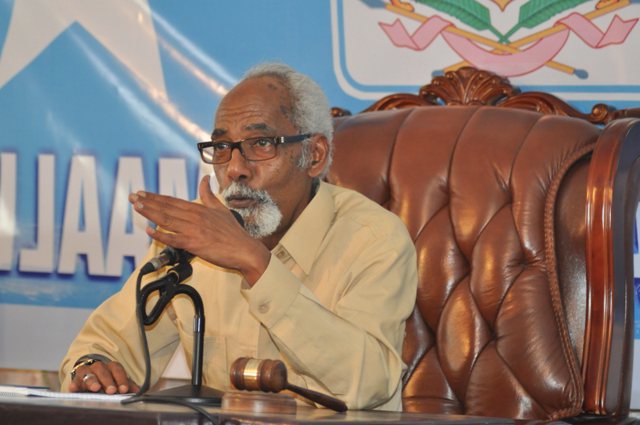Speaker rules impeachment motion illegal, Fawzia fires back

Speaker of Parliament Mohamed Osman Jawaari yester evening touched off a political storm in the country following his declaration that the impeachment motion against the president lacked any legal basis and therefore rendered redundant.
Former foreign affairs minister Fawzia Yusuf Adam, once a close ally of President Hassan Sheikh Mohamud fired the first salvo dismissing the speaker’s declaration as an exercise in futility on grounds that he lacked any legal authority to make such a ruling. Fawzia has been one of the key backers of the impeachment motion.
Penal Code
In a statement to newsrooms last evening, Jawaari said he had heard and consulted with various stakeholders including lawmakers, offices of the president and the prime minister before declaring that the motion had no legal standing. Jawaari said the concerns raised in the impeachment motion did not meet the minimum threshold as provided for under Article 84 of the Penal Code.
“The statement from the speaker is wrong and illegal. He is not a judge, he is the speaker [of Parliament]” Fawzia
With that, the Speaker dealt a blow to attempts by a group of almost 100 lawmakers who had filed the motion to send home the president for what they termed as gross violation of the constitution.
Constitutional mandate
But Fawzia has rubbished the speaker’s decision noting that he does not have the constitutional mandate to declare on the legality of a motion of impeachment. “The statement from the speaker is wrong and illegal. He is not a judge, he is the speaker [of Parliament],” said Fawzia.
Fawzia also faulted the speaker on claims that some of MPs behind the motion had backtracked and dissociated themselves from the move.
“The idea that some of the MPS who previous undersigned the impeachment motion did reverse their decision is false. Now let us pause and ask ourselves, does the speaker have the power to turn down the motion,” Fawzia posed.
Fawzia said it was now becoming impossible to impeach the president or even pass a motion of confidence against the prime minister since the speaker had arrogated himself powers and authority bestowed upon the courts.
In his memorandum, Jawaari indicated that all parties concerned had agreed that the motion be dismissed and dialogue be pursued as it was necessary for the sake of stability of the nation.
“The parties concerned have agreed on the motion under discussion is finished and be notified to attend a meeting-by-all-means and resolve issues mentioned. The President, the Speaker and the Prime will participate in a meeting which will take place on Wednesday at 7 October 2015 and recommendations of the outcome will be presented to Parliament,” read the memorandum in part.
Procedure
The move by the speaker is yet another development in the impeachment motion which has raised more questions that answers regarding the actual position and procedure of impeachment.
The Provisional Constitutional bestows authority to parliament to originate an impeachment motion against the president upon which the constitutional court will determine the legal merits before transmitting it to parliament for a vote should it find it in the affirmative.
However the absence of the court has technically left the motion in limbo which could partly explain why the speaker decided to determine its fate. The speaker had earlier in the month asked parliament to deliberate on the best possible way out which would among others lead to the establishment of an ad hoc constitutional court.
Parliament has gone on recess until October 21, 2015 when the 7th session will start.